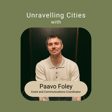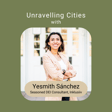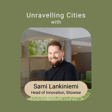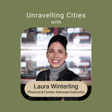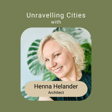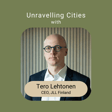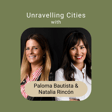Become a Creator today!Start creating today - Share your story with the world!
Start for free
00:00:00
00:00:01

Communal living brings the village back to the city
Urban villages – that’s the word Future Living Specialist Kimmo Rönkä uses instead of suburbs. In this episode, we’ll learn about the benefits, the challenges, the possibilities, and the requirements of communal living.
Transcript
Introduction to Kim Moronka and Future Housing
00:00:19
Speaker
All right, so welcome again to the Unraveling Cities podcast, where we discuss topics about cities. And today, we have an interesting guest here. He's an expert in the future of housing, and in a lot of things, because we have been already discussing here before recording.
Kim's Journey to Sustainable Living
00:00:40
Speaker
But today, our guest is Kim Moronka. And welcome, Kim. Oh, yes. Nice to have you here. Thank you. Nice to be here.
00:00:49
Speaker
Yeah, nice. And if I start here, could you tell us a little bit about your background and how did you get interested in this topic, the future of housing? Maybe I have to go back 20 years ago or 25 years almost. I started to work at the University of Art and Design, Housing Kids, today at the university.
00:01:15
Speaker
there was an organisation called Future Home Institute. There I studied as a project director and then after two years I studied to be the director of the institute. And there, you know, my background was in University of Technology. And there I understood that those designers started to talk about users.
00:01:41
Speaker
very empathic way and that was so inspiring for me. But I've been following this approach most of my career, working with designers, trying to make different living concepts as a consultant and working as a social housing company.
Why Focus on Climate Change?
00:02:06
Speaker
And maybe the last five years, the most shocking moment was when I watched the IPCC report was published. Then I noticed that no way I have to work my career that is left only
00:02:31
Speaker
as a planet saver, you know, meaning that everything what we have to do is related to climate change and we really have to do our best to save the planet to the next generation.
Urban Villages vs. Suburbs
00:02:46
Speaker
So future living is the key point there because it's not only housing, it's work, live and play, hobbies, your home family, your friends, and it's more related to neighborhoods, blocks. And that is what I've been, you know, learning and learning and learning. But this is something very interesting because you said that you were there, was it 25 years ago?
00:03:12
Speaker
Yes, it was 2000. The whole institute was founded in 1998, and I started to work there in 2001. Okay. So it was related to Arabiyaranda area, which is one of the housing areas in Helsinki. And so we were there near the construction project.
00:03:38
Speaker
And the idea was to develop new projects, new approaches that can be used in real construction. Okay. So you were working a little, so maybe with construction property developers. Yes. Yeah. So it's interesting. This was then in the 90, 98, 90s.
00:03:59
Speaker
And we can say that if we already have an institution that is teaching that, I guess the concept has been marinating in people's minds already, maybe from the sixties, from theories of urban planning. So I guess that in order to, what I'm trying to say is that this is a very old concept, like housing, communal housing. It is.
00:04:24
Speaker
And maybe when you say here that it's about work, living and playing, didn't we used to do that before? We have this metropolis, or what do you think? Sure. And I always say that the oldest way of living is living in a village. Yeah, exactly. So in my mind, it's returning the village to the city.
The Concept of '1, 2, 3, 4' Living
00:04:53
Speaker
And I always, I studied actually when I was as a researcher in VTT, Technical Research Centre of Finland, about thinking about urban villages, not suburbs. I always used the word urban villages. That is what life is all about. Functional approach is too narrow. Yeah, I agree. And that is, I rather call living instead of housing.
00:05:24
Speaker
because especially after the pandemic, this COVID period, we needed more space in our homes, but not only the flats, but also the neighbourhood areas. And those areas who had resilience to stay there were the winners. Yes, I think that's a very interesting thing to explore.
00:05:53
Speaker
Because the more we urbanize cities, the more densified we become, we start thinking that maybe home is just a place to sleep and then we go out. Whereas it could be also a place of
00:06:12
Speaker
a lot of encounters because your home extends, maybe. Exactly.
Benefits of Communal Housing
00:06:20
Speaker
And I have this, one of my favorite slogan is the code for future living. It's easy to remember. One, two, three, four. Now you know it. One, two, three, four. It means
00:06:34
Speaker
In the future, you live alone or together with somebody. The third room is in the block and the fourth room is in the city. It means that all flats should be big enough that you can live together with somebody.
00:06:51
Speaker
and most of our flats are smaller so we need extra space and that is for we need these third spaces and it's the same in in co-working third spaces but it's the same in co-living third spaces are shared spaces in the blocks and the fourth
00:07:13
Speaker
room is the restaurants, cafeterias, music halls, and all that amazing things are in the city. Yeah, the public spaces. I think we can connect what you're saying of coming from one singleness in the number one.
00:07:36
Speaker
to the force, this mayor of Bogota was it that he said that public spaces is a right for everyone. And we should use public transport as well. We should, you know, create them like extended living rooms. So I like your, the way you put it, like from
00:08:01
Speaker
singleness and then number two, now I try to remember, partner and three, share space and fourth, the city. I've been working also trying to develop a housing for people with intellectual disabilities. Yes. And there, the point is that they should also have relationships. Yeah. So it's not only a flat, small flat for you, but it's you have a
00:08:30
Speaker
equal right to have a, leaving a couple, get married or whatever. Yeah. So the spaces must always be big enough to have a white bed. Yeah. Nice spaces for your individual needs. I agree. And then next is these communal spaces, these shared spaces that
00:08:57
Speaker
And also the idea of sharing, that it's no sense to own everything in the future, no sense, that's stupid. Yes, yes, I agree. And if it's a beautiful, good block, you don't need a washing machine, because there is then a beautiful, cool laundry. Yeah. And you don't need to own sauna, even if we live in Finland, because if it's a good block there in the roof, it's beautiful.
00:09:27
Speaker
roof sauna. And you don't need a gym card because in a good block there is a gym room. So the idea is that instead of a small building we should think about bigger blocks, which means that there are two or three or four developers who work together
00:09:57
Speaker
And there should be one architect in
Fostering Community Through Shared Living
00:10:00
Speaker
the block who designs the whole block and thinking there is no seamless architecture. There is no borders based on architecture. There is only one flow in the block and that's called living.
00:10:20
Speaker
I agree. I will come back to that and ask you a question regarding that. That's super interesting. But maybe just to clarify to our listeners, recently you wrote this article in a newspaper.
00:10:36
Speaker
in Helsinki, Sanamal. And this was about communal living and how it should be brought as part of the green transition. So if we start from the beginning, now you gave us an introduction. What is communal living then for you? For me, communal living is, for example, that there are many different living cycles in everybody's life. We are young children, youngsters,
00:11:06
Speaker
And then we start to work and we maybe go abroad and then we start a family and then we raise our kids and then go and finally we are elderly. And I think this whole living cycle is the idea that we should have in our mindset, meaning that a good communal block consists of all of these.
00:11:35
Speaker
So it's not only seniors, it's not only for students, it's for everybody. And I think communities is, for me, I think we human beings have roots like trees. And we grow into the city. And it's not only the roots, there are also microbes.
00:12:03
Speaker
near the roots, which you can't see them, but you need those. And it's the same with human beings. We have roots, we have stories, we have also these micro connections, memories, and all those things. So my point is, it's good for people to grow in that kind of village, once again, that you have good roots. Yeah.
00:12:31
Speaker
Because in a village, you can also share the things. It's not only services that you buy from companies, but also how to say people make, you can ask favors. Can you help me there? And if you go to the family, I call it helping economy. It's not, it's, you know, one part of sharing economy, it's helping economy. You help your children.
00:12:59
Speaker
And when their children grow, they help you as an elder. Yes. So that's like an ongoing process that's been always and that will be always. And it's, you know, it's very cost efficient if you have these microbes and these roots. But if I go back to the common common living, meaning that the point is game one, two, three, four, meaning that
00:13:29
Speaker
We all have own flats, maybe smaller, larger, single person or smaller unit, family, larger unit. But then there are these search spaces like laundry, gym, sauna, hobby rooms, communal kitchen. And they are, you can use those.
00:13:53
Speaker
based on your life, meaning that if you have a party, but also there is a connection between the people, and in some cases, and I think the best communal spaces, there is, how to say, a block coach, who is coaching people to the communities.
00:14:13
Speaker
And he is like the wise man of the village. It's but you know, it's it's it's living in these communal houses is very important. What's your passion? Are you a music guy? Are you making food or are you a farmer?
00:14:37
Speaker
or whatever,
Community's Role in Mental Health
00:14:38
Speaker
and then you ask others, would you like to, let's do something together.
00:14:45
Speaker
And this is also part of the communal housing, that you do things together. That is your passion. And that is, because we are all different. Some interests are very different than mine. So in a block, there could be maybe five to 10 different micro-communities who can manage by themselves certain things.
00:15:22
Speaker
You awaken a lot of thoughts in my head. And let's try to see if I can tie them together. But I like, I start with the easiest one. Jane Jacobs was also speaking about this a lot. And what amazed me is that she was comparing these very dense traffic, you know, full of things happening, blogs in New York.
00:15:51
Speaker
where you would probably feel that a kid is not safe, but she was arguing that it was safer for a kid to be there than in a park where no one is watching.
00:16:04
Speaker
And she described these happenings, like you're describing, that if your kid is outside and you know everybody in the neighborhood knows that that's your kid, they would be watching the kid. If some stranger approaches, everybody knows each other. So then you know that, hey, who is that guy?
00:16:23
Speaker
Or then you can leave your keys to the butchery, like downstairs, you know, hey, I have someone coming to repair, I need to go to work, here are my keys. And, you know, that sense of community or helping each other. That's exactly the sense of community we actually try to analyze, we try to, how to measure.
00:16:46
Speaker
we didn't find the right tools for, but I suggest that you study in the future, the sense of community somehow. But also about this child, you know, you need a child, you need a village to raise a child. So that is, we need those uncles and guys saying that that's not nice, or they are, you know,
00:17:12
Speaker
all positive things, but it's important to have different age adults. Yeah, and now maybe I tie the other one, the other point here, that you're mentioning this about raising a child, how important different points of views are. You mentioned also musicians and chefs and everybody and gardeners, everybody has an ability.
00:17:37
Speaker
And also everybody has different thoughts and personalities. So I was thinking that there's a trend in the individualism in general. Maybe it was originated by our thoughts and what we are reading or social media or the size of our apartments or just like complex things of situations that have made us or pushed us to be more
00:18:06
Speaker
and more individual each other and focusing ourselves and maybe made us a little bit more selfish. I know we're speaking a lot about mental health, about how we need therapy and so on, but I'm a believer that if we listen to the other ones,
00:18:26
Speaker
we would have better mental health if we would learn to be good listeners to others.
Age Diversity in Shared Spaces
00:18:32
Speaker
So for me, this living in a community also means that we are learning behaviors. You know, when someone gets upset at you of how you spoke, you tell it to the face that that was rude or that was not nice. Like you're saying to telling a kid or, hey, I loved the way that you do this.
00:18:55
Speaker
And when we give feedback, constant feedback, we learn that to behave in a society, that we all have weaknesses and strengths. We are human beings. We are hurt animals with two legs. So walking and wandering and we are curious in the environment and we enjoy living in groups.
00:19:24
Speaker
That is why we have 8 billion of us today. It's because of our ability to work in the groups. And it should be the same. All best companies have best teams. And we think that's just for individuals. How stupid. And I believe that the best
00:19:49
Speaker
The most beautiful environments should have also the best beautiful communities. So it's really important to have content. Empty walls are nothing without rich communities. I agree. I completely agree. And the exchange of ideas and so on.
00:20:09
Speaker
You mentioned also something about different ages in community living, generations you said, or you described as living cycles. So you mean that different generations need each other to support parents or kids or whomever? Do you think that opposes a little bit the welfare state, for example, from the Nordics where the government and the welfare state has to provide
00:20:39
Speaker
Actually, if I go back to history, about 12 years ago, we started a concept development called Generations Block, which is today in Yatkasari housing. And there we analyzed the living rhythms of different age people. And we noticed this is, as you said, this sharing is one point, but also
00:21:06
Speaker
If we want to live in circular economy where we don't build empty spaces, we build all the spaces that are used. So we analyzed that young people are more active in the evenings and seniors were more active during the day. So we could have the same spaces for elderly and young people
00:21:37
Speaker
Because, you know, elderly go to Tibet, they, you know, they are more active in the mornings. So it's also, there's a sense to combine these different ages. It's from seven to 22.
00:21:56
Speaker
There are a lot of different time slots for different people in their own life. And the block could be like a mess of a flow of different things. And that is one secret is the meetings or connections suddenly.
00:22:18
Speaker
Just you see somebody and it's like in a city, you walk and you meet your friend there and you have wonderful discussion. The same in this block. You could have wonderful suddenly meetings with maybe a bit strange guy, but it's a block that allows you to walk.
00:22:40
Speaker
If we compare one building with one staircase and one block with a shared big common space, there are a lot of different, more diverse flows. It's also about people flows. You know, human beings and car are opposite. Cars, if you drive a car, you hate jams.
00:23:07
Speaker
But as a human being, you love jams. You need to rush hours to meet people otherwise the empty city is scared. Yeah. But if it's full of people, it's wonderful. It's opposite with cars. Yes, yes. That's very true. And that's maybe in summer when you see life, you know, you get more energy as well. And everyone there in the space, of course,
00:23:38
Speaker
I'm not speaking of really tight spaces, but that you see people and you see movement. I agree with you. And it's also this eye connection. When we designed a generations block, there was this idea that we get wider corridors in order to have better eye contacts. And that was because of if you can't go without saying hello.
00:24:08
Speaker
And that was one idea. We have to force people to say hello, because for Finnish people it's a shy nation. And after they have worn this shyness, they are wonderful. Yes, absolutely. I agree. And it could be wherever. And I've noticed that sometimes when I smile, people immediately smile back at me.
00:24:37
Speaker
What is this, you know, something different? Exactly. And this is what was that when I talk about this community coach, when they are professionals in some social housing companies, there are professionals who help communities to work. And always say that they are those those are the friendly faces. The smiling faces. Yeah.
00:25:01
Speaker
Because if somebody is there with a smile, others will smile again. So this is, we are human beings.
Challenges in Adopting Communal Living
00:25:10
Speaker
Yeah, and it multiplies as well. You get kindness, you give kindness, yes. Exactly the point. The point is sharing kind. It's actually a social capital. And it's the only capital that is the amount of capital is rising when you are using it.
00:25:29
Speaker
So maybe this is one of the benefits of having community that you call it now human capital, social capital. Then you also discussed about welfare, about helping each other. And that's good for economy. We discussed about mental health. So all these are benefits of having a community. You go empowered to work. You purchase like economy moves when we are also feeling good.
00:25:59
Speaker
My point is here that you have to learn. And one of the inhabitants said that it took two years to get familiar with this. But after that, that was wonderful. So we just have to have these pilots. We have to have these blocks in order to have experiences. Because we lived in villages.
00:26:28
Speaker
50 or 100 or 200 years ago. There it's all genes and in our DNA, but in this modern life, individual thing is that it is somehow disappeared.
Co-Living: A Sustainable Real Estate Model
00:26:44
Speaker
Yes. And it's very important that you mentioned this, that it took two years because I think that when we jump into these kind of pilots, especially with the real estate, now I will come back to my question.
00:26:57
Speaker
especially the real estate that wants to have fast return on investment, it's very difficult to measure the impact of these communities. And when it takes two years, it's important that we raise awareness that we also mention that it will take time. We're all humans, and we have habits that are difficult to change. But once we do it, the benefits will show in this scale.
00:27:25
Speaker
It is the helping economy that is growing there. It's both wonderful and it saves money for communities as it is. Yeah. Why don't you think, Anton? We haven't adopted this trend yet in Finland so heavily. Why are we not changing or adopting this more?
00:27:55
Speaker
I think it's because of our real estate and construction businesses to product oriented. We should think this as a service, not as a product. And I think traditionally construction companies have their business models, they build and leave it.
00:28:15
Speaker
And most of the real estate owners, they just, as you said, it's the two days point not long span. But the next thing is why it's not so often happen in our cities is the cities who still sell plots, individual plots for different developers. And they do their own business and that's it.
00:28:45
Speaker
strongly recommend to the cities that they give the block to the developers and ask what is your communal concept and somehow also think what is maybe leave it to five years that it will live, it will live.
00:29:05
Speaker
And maybe the property owners is also a problem because they have been focusing on electricity or heating or today they are doing with solar panels and maybe something else but they also should be more interested in maybe long span things. How can we motivate then a property owner? I mean, what would be the gain for a property owner?
00:29:34
Speaker
when we speak about these blocks. I think the point is that I know because I worked four years as a CEO of a social housing company and our, how to say this, empty use was one of the lowest in Finland because people enjoyed living there. So it was worth of money. And also because of communal spaces,
00:30:03
Speaker
There were no, you know, those kitchens, all those areas where totally without any criminal things, because they were their own, they were ours. So it's the feeling that we save money by communal housing.
00:30:24
Speaker
Yeah. But this is, you know, it is not easy. You need to work, work hard. But as a result, you get more satisfied inhabitants. Yeah, so occupancy rates are high. Exactly. And you get them to stay longer. But you also mentioned that maybe you have as an asset manager, or property manager, you have to stay longer with the project.
00:30:53
Speaker
So maybe it's like a long-term investment or... I think also property owners should brand, have their communal brands, co-living brands. I just heard a podcast that it's really going to be mainstream in other cities in globally, co-living. Yeah.
00:31:17
Speaker
It is now it's a niche, but it is coming. I believe also in Finland, it will be a mainstream, but it needs and there are also, you know, there are possibilities for real estate owners to make their own brands. Yeah.
00:31:37
Speaker
And maybe the last one is also this, how to say this in Finland, if we talk about Finland, it's these professionals who are taking care of all this. We don't have a co-ops, housing co-ops or groups of people that
00:31:57
Speaker
collect their tribes and communities and build a house. Some senior houses, some individual pilots have been, but it's not a trend. And maybe there should be some kind of next-level user-driven developer needed as well, who would develop affordable communal housing. Absolutely.
Systemic Changes for Decentralized Living
00:32:24
Speaker
If we think about the cities that are getting empty, you know, for example in Helsinki, because of families don't have enough money to buy the flats or rents are too high, but if it's a communal block,
00:32:41
Speaker
that you don't need so much space of your own, you have all the abilities around the block, then it's affordable. I call it new affordability based on communal housing. I know at least some urban developers from Denmark.
00:32:59
Speaker
We have also, we are present in that market and we've been discussing and they seem to embrace this co-living more. This branded co-living is very hard, very strong and they tend to look for, we've noticed, what are they interested in when we speak about insights? What do you want to know about the location and what are you missing?
00:33:24
Speaker
I realize that a difference between markets is that in Finland, we are more oriented to who's a property owner and what is the return best. In Denmark, they do look at how many services are there, what is a 15-minute reach, how can people bike there, and what is a forecast.
00:33:45
Speaker
Is this going to make people happy? So we have seen a difference there. I understood what you mean. And that's true. As I said, our real estate people are the real estate people. And they should have a neighborhood approach. It's also a question about services, because a block could be a perfect service platform for different services.
00:34:13
Speaker
And it's it's good business. It could be a good business. Because it's if you make a, you know, like, like a car searing service in a block, yeah, you can limit your amounts of parking spaces.
00:34:29
Speaker
And also different kinds of services that are in the block. It is a good business. And the point is it could be open for neighborhood as well. So it's not a closed gated garden. It should be open for neighborhood as well. But the point is that they don't see this as wide as this should be. Maybe the point is they are housing operators. They should be living operators.
00:34:59
Speaker
Yeah. I'm happy to hear this, that you have this concept and you're also putting a lot of the solution into the property developers, the city, the public sector and how they do their zoning. And I guess this will also transfer to the real estate investors who are investing in multiple developers at a time.
00:35:21
Speaker
maybe more difficult to get an investment from that point of view. But in one of our episodes, we were discussing with Tero Lehtonen, the CEO of JLL Finland. And he did make one very good comment. I mean, he made all the good comments. But one that now I remember is that I asked him, how is the industry moving? Like, what do we need to change now when we have had COVID and this
00:35:51
Speaker
working conditions changing and everything, you know, and now with the war. So he did say that he thinks that we should focus more into people. And I love that answer. And he said, we definitely need more asset managers that start focusing in what people want, what they need in allocation. And we started speaking about, should we listen to people when we build?
00:36:20
Speaker
And now you're discussing about that exactly. That's listening to people, what you're doing, listening to what they need and how they feel and everything else. And he was more interested in how do we keep this, you know, as a good investment when we listen to people. So he did also say that when I asked him about the public side, what could the public side do differently?
00:36:46
Speaker
He mentioned that the zoning could be much more flexible. And I am understanding also something similar from your side, that the public side, now I asked the same question to you, what would the public side need to do with the public sector for these to be easier to realize?
00:37:05
Speaker
cities are evolving. And I would go also to the slogan that climate change, system change, city planning change. So it's a systemic change that we should have in city planning.
00:37:24
Speaker
It should not be the same as it used to be. World is changing and zoning is exactly one of the key points that it's not only this business area in the centre and suburban areas. It's an area of 20 to 30 urban villages in this region. And they all should have abilities to do things on their own.
00:37:54
Speaker
And we could have diverse housing areas with diverse things.
The Five-Minute Community Concept
00:38:01
Speaker
But it needs new zoning. And because it's not the same anyway going to the centre to work and back to home. No, no, we all work. I haven't had an office of my own 20 years.
00:38:16
Speaker
not office on my own. I've been working in these kind of, you know, co-working environments. I hate separate rooms. I've been working in cafeterias, in hobbies, when children are where their music lessons I worked there. So I work wherever I work. And it's this is changing. So it's not, as I said in the beginning, work, life and play.
00:38:46
Speaker
hobbies and so on, and you make your own concept based on your lifestyle. I said that when my child had their hobbies, I worked there. Today, my father is 90 years old. He's in a service home because he can't stay at home. He just called me this morning and I'm going to have a cup of coffee at two o'clock there, and we go around the neighborhood there.
00:39:16
Speaker
And I've been suggesting those home for elderly that you should have a co-working space, because in the future, we take care of our children as well, and mostly we take care of our parents. So, and elderly are active during the day. So it's much more nicer to meet them during the day, having a coffee in a cafeteria and walking there, and I can continue working in the evening.
00:39:46
Speaker
So our cities should change. Yeah. So you, we were speaking also mentioning like what a neighborhood has to have and about the 15 minute city that is, I think it's more discussed in Denmark as well. But you, what do you think of that? How do you see that communal living and co-living fits in there? That's my point is that it's a great concept.
00:40:15
Speaker
because it is an urban planning, a regional concept. And I think that we should also talk about five minutes communities. Five minutes communities is this every day of your life, meaning that we should talk about where the life happens, meaning maybe it's saying hello to neighbors,
00:40:40
Speaker
Seeing family, smiling eyes, telling jokes, laughing together and trying to understand this, you know, it's not fast, it's slow. And I think in neighborhoods or in blocks, maybe in the cities we constantly talk about, we should, you know, faster the speed. But if we think human approach, you should slower it. Yeah.
00:41:08
Speaker
And I think five minutes communities is where life happens. And it's maybe it is every day you need something just something happens in the block and you need instantly help. It takes five minutes to get it. And it's somehow secret, it's behind, but it creates safety and security to the block.
00:41:34
Speaker
to the living. You feel safe when things, there are others as well. You are not alone. Yeah. I like that because we've seen that a lot of, I was reading a blog about this communal living. And one thing that they were speaking about was this livability, like in these five minutes that you're speaking about.
00:42:04
Speaker
When you see people, when you discuss with them, your health also improves. So for example, Alzheimer, it lowers the possibility to get because I also believe that when you're, and there has been some studies, when you're active in your brain and your movement and everything and discussing, your brain is healthy as well. But when you aren't lonely, it continues to deteriorate. So then we get old.
00:42:34
Speaker
So I'm a firm believer that if we continue to grow and meet people and build this, you know, community in whatever stage of life we are, we will also be healthy, physically and mentally. Yes, the point is, you know, in Finland we talk about we try to help people to live at home. That's important. But I think the next step is to get out of there.
00:43:04
Speaker
Get them to the city to meet others. And it's an
Integrating Nature for Community Health
00:43:11
Speaker
attitude. I just noticed that when living in an elderly home, when you bring a very small child there, look at those elderly. They are so happy to see. And if you give a baby to an elderly, he or she really feels something that this is life.
00:43:33
Speaker
And also kids. Also kids, it's the same, right? They feel that this person is more tender than my parents and sweet. Exactly. And I think it's also related to nature. And I believe that nature is the next big thing in our neighborhoods, that we should leave the old trees, we should rise. You know, a pine in Finland, it can live to
00:44:02
Speaker
150 years and then it starts to die and it dies 200 years and finally it falls down and it goes to dust 200 years so it's 800 years span as a tree so it's it's 10 times longer than us so that is why people love old trees
00:44:28
Speaker
Yeah, there's some, some magic, some, some, something very strong feeling in it. And I think it's these kinds of things are human things that we should have in our neighborhood and in blocks in order to have this, you know, active life. Yeah. You, you mentioned these now, I have read a book this, um, now I forget, uh, entangle life. I know it. Yeah. So.
00:44:57
Speaker
The roots connect through fungi. And when a tree falls, it is fungi that also brings new life. It is. So it's a cycle, as you were mentioning in the beginning, the cycle in a community. And in our very urban environments, we need these kind of microbes as well. Yeah.
00:45:21
Speaker
You know, 25% of our DNA is the same as the trees. So we are very close to trees, so it's not only trees, it's us as well. We should have our foods in the dust.
00:45:37
Speaker
So we need also, you know, during the summer, you should walk without shoes because
Communal Living as Climate Action
00:45:43
Speaker
it's good for your health. You need those microbes. You can get those. Yeah, yeah. I'm one that does that all the time. It's good. It ended up with a lack of feet. But now I have one more question here.
00:46:02
Speaker
In your article, if I go back to that, about this communal living being part of the green transition, and can you concretely tell a few points in how will it help to the green transition, for example, where also help the real estate industry? As I said,
00:46:23
Speaker
the living in the village is the oldest way of living and circular economy is the oldest economy. When 200 years ago
00:46:35
Speaker
where we were living in villages, we saved all the material and it was just like all cool things. And at the same time, we lived in that community. So my idea is that without the connection to community, we can't do the climate change work that is needed enough fast. If we do it in
00:47:01
Speaker
concentrating individual level, it's too slow. We need learning, we need... And that is why I have to say that I'm involved in a new block called Circular Economy Block. It will be built in Yatkasari. After two years, it will be there. So it started already? It started, the design process is ongoing and the building will start in the beginning of next year. It takes two years to build it.
00:47:29
Speaker
And there is in the heart of the block, there will be 400 square meters space for Southern Helsinki Adult Education Center, meaning that it's a lifelong learning in the heart of a living block.
00:47:47
Speaker
So circular economy and the green transition is part of how they teach people. And the point is that we have the whole learning process to this intergenerational community. So we learn to live more green way. Yeah.
00:48:09
Speaker
by teaching each other as well as well turning and it's not only about flats it's it's also about clothes the food yes the toys yeah whatever it could they all can be shared yes and and we could also
Innovations in Urban Sustainability
00:48:27
Speaker
you know we have so much storage spaces at home but what and it's it's a passive space instead of it should be active space that those
00:48:40
Speaker
clothes and whatever they are, like. Circulating. Circulating. And that's important. So I believe that. My point is that we need communities. Yeah. And the real estate, once again, the solution is how we design the buildings and the blocks. Yeah. How to make things happen there. Yeah, I agree.
00:49:06
Speaker
And that is, I think also, you know, I've been saying, you know, not nice things about real estate, but I said optimism way that this could be the best business in the world to be active in this pre-intransition real estate. Yeah, and benefits everyone. And real estate is the one that starts, you know, enabling.
00:49:31
Speaker
40% of carbon footprint comes from construction. Yeah. And the decisions that we take also as municipalities, you know, cities, public sector and investments as well. So everything needs to be like well-fought to enable this. And also I would say this is also an energy transition. We need these things that
00:49:58
Speaker
We've done a lot of solar panels, thermal heating and so on. The next thing is energy storages. I believe that in 10 years time there will be storages in blocks. And another thing is food transition. And it has just started. You know that in Singapore they have aimed, 2030, that 30% of food should be produced locally.
00:50:27
Speaker
So, and I believe this is, next blocks will be related to food. It's not only green roofs, it's how much can this real estate plot grow food. So there will be also new technologies like aquaponic farming or hydroponic farming and vertical farming spaces. And so we are in a hurry.
00:50:57
Speaker
immediately start designing these kind of buildings and blocks and neighborhoods.
00:51:03
Speaker
Yes. So now I think we are reaching to our end, but I will summarize quickly. Let's see if I got it right, what you have been mentioning. So we spoke about what was communal living or the future of housing. And you mentioned this, that it's work live and play. I agree with this. And also it's like living in a village, like returning the village to the cities in a way.
00:51:33
Speaker
You also mentioned that we have to have the small building versus bigger blocks and there was a key point there about having one architect and two developers so the idea was that. More developers can really work together yeah work together and that cities should enable this as well but that's one.
00:51:54
Speaker
Good point. We also went through the benefits, mental health, welfare, social capital, some challenges that we see that today is unplot by plot. The city is giving plot by plot and maybe property owners are seeking faster returns. So there's some challenges, but there's good solutions also that you propose like
00:52:17
Speaker
Let's give the blog for developers that let's start building brands about co-leaving. Also as a property developer, we have higher occupancy rates and also be life driven developer, like, you know, pro that pro climate change, plug green transition as well.
00:52:40
Speaker
And then also about this green transition, you mentioned that energy, food transition, circular economy, saving in general, all the benefits that are going to help, like communal living is helping also today. Am I missing something that you want to? Also, mobility is something that, but it's a real stat.
00:53:05
Speaker
owning a car is so last century that we don't have to talk about that. Yeah, mobility. That's true. And there's a lot of discussion about that. But this is great. I think there's a lot of good ideas. I think you have done also research if someone wants to search more about what are the benefits also for property developers, like with numbers and more factual figures. I think that's super interesting.
00:53:39
Speaker
But now I will ask you some questions, like a fire chat here. And the idea for you here, these are improvised, so that you just answer as fast as you can and whatever comes from your heart. So I go through them. Where is your dream place to live? Near the sea. Nice. Public transportation or own car? Public transportation, of course.
00:54:09
Speaker
Yeah. Would you rather live in the future or in the past? Future. Hmm. Interesting. Nice. I don't know. It depends on the kind of future. Summer or winter? Summer. Okay. Summer by the beach. And then what motivates you the most? Difficult things. Yeah. That's why you're here. Exactly. And you know, it's my comfort zone is un-comfort zone.
00:54:37
Speaker
And my own comfort zone is comfort zone. Nice. Yes, that's a good mantra. Morning or evening? Morning. What advice would you give to your younger self? Concentrate and do it now. So for everybody listening, concentrate and do it now also. And finally, past our pizza.
00:55:06
Speaker
OK, great. Yeah, so this has been amazing. Kim, I could speak to you like forever. But there's one final question I want to ask you that we ask everyone before we leave. So if there were no limits, what kind of technological innovation would you invent to make your life easier in the city? And this is a difficult one.
00:55:34
Speaker
I've been doing something related to public transport before. And always I said that biking and public transport should be like sisters and brothers. It took 10 years to get bike cabins in trains in Finland. But in the future, I think we should have, Helsinki is near the sea shore, we should have bike boats.
00:56:01
Speaker
bike boats. So a bike with a stroller is like a car with family. Family with a car, meaning that you have all the things there. So we should have these kind of things and public transport designed by these principles. So this really urban mobility
00:56:25
Speaker
solutions and especially I would like to have electric bike boats to connection because we have a lot of open space in the seashore. Yeah, I agree. Hey, it has been amazing having you here, Kimo. I'm very inspired by what you're saying and hopefully also our listeners, so thank you very much. Thank you.

